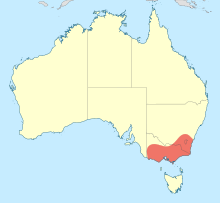Telephlebia brevicauda
Telephlebia brevicauda is a species of dragonfly in the family Telephlebiidae,[3] known as the southern evening darner.[4] It is a medium to large, dark chestnut brown dragonfly with dark markings on the leading edge of its wings.[5] It is endemic to eastern Australia,[4] occurring in alpine New South Wales and Victoria, where it inhabits boggy areas,[6] and flies at dusk.[5]
| Southern evening darner | |
|---|---|
| Scientific classification | |
| Kingdom: | Animalia |
| Phylum: | Arthropoda |
| Class: | Insecta |
| Order: | Odonata |
| Infraorder: | Anisoptera |
| Family: | Telephlebiidae |
| Genus: | Telephlebia |
| Species: | T. brevicauda |
| Binomial name | |
| Telephlebia brevicauda | |
 | |
Telephlebia brevicauda appears similar to Telephlebia godeffroyi.[4]
Gallery
.jpg) Female wings
Female wings.jpg) Male wings
Male wings
gollark: Did you know? Our bees are representing you as a product of prime numbers as we speak.
gollark: Fascinating. Maybe it treats me not defining a cloak mask thing as denying it. How strange.
gollark: As far as I can tell it was *always* available.
gollark: Define the type and have it automatically write it out.
gollark: Those are only 10% of demand.
See also
References
| Wikimedia Commons has media related to Telephlebia brevicauda. |
- Dow, R.A. (2017). "Telephlebia brevicauda". IUCN Red List of Threatened Species. 2017: e.T14259993A59256443. doi:10.2305/IUCN.UK.2017-1.RLTS.T14259993A59256443.en.
- Tillyard, R.J. (1916). "Life-histories and descriptions of Australian Aeschninae, with a description of a new form of Telephlebia by Herbert Campion". Journal of the Linnean Society of London. Zoology. 33: 1–83 [34] – via Biodiversity Heritage Library.
- "Species Telephlebia brevicauda Tillyard, 1916". Australian Faunal Directory. Australian Biological Resources Study. 2012. Retrieved 20 March 2017.
- Theischinger, Günther; Hawking, John (2006). The Complete Field Guide to Dragonflies of Australia. Collingwood, Victoria, Australia: CSIRO Publishing. p. 144. ISBN 978 0 64309 073 6.
- Watson, J.A.L.; Theischinger, G.; Abbey, H.M. (1991). The Australian Dragonflies: A Guide to the Identification, Distributions and Habitats of Australian Odonata. Melbourne: CSIRO. ISBN 0643051368.
- Theischinger, Gunther; Endersby, Ian (2009). Identification Guide to the Australian Odonata (PDF). Department of Environment, Climate Change and Water NSW. p. 238. ISBN 978 1 74232 475 3.
This article is issued from Wikipedia. The text is licensed under Creative Commons - Attribution - Sharealike. Additional terms may apply for the media files.
